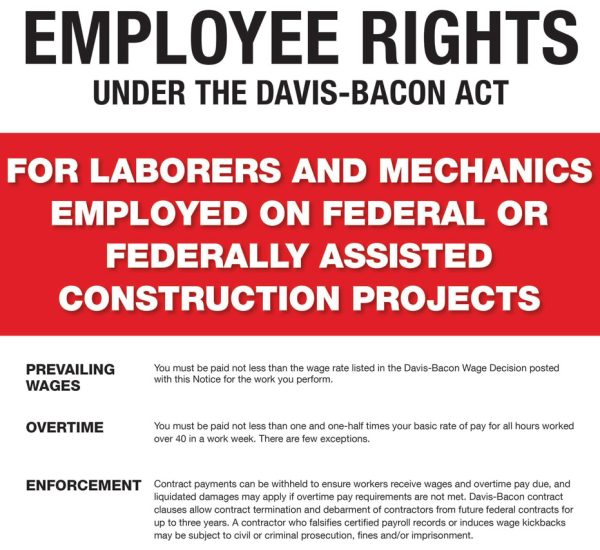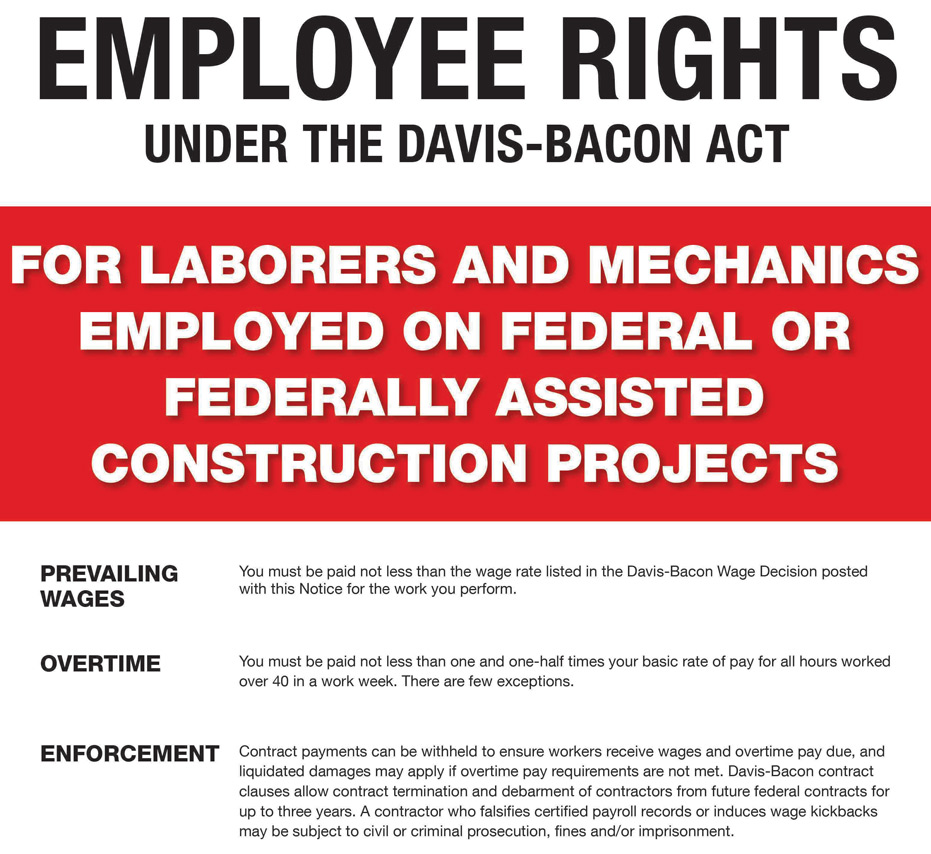DOL updates wage regulations for federal projects.
by Kaija Wilkinson
The U.S. Department of Labor (DOL) recently updated the Davis-Bacon Act, which sets prevailing wages contractors are required to pay workers on federal projects. The “first comprehensive review in nearly 40 years” — a hefty, 716-page tome published in the Federal Register in August and going into effect on October 23 received more than 40,900 comments during a 60-day comment period and is “sure to face legal challenges,” Construction Dive reported, citing Roll Call.
Originally passed in 1931, the Davis-Bacon Act uses DOL-administered pay surveys to set current wages in federally funded projects. Prior to October 23, the act stated that at least 51% of surveyed wages need to be within a “same or similar” margin. If they are not, the weighted average — as opposed to a simple average — is used, leading to more frequent occurrences of low wages dragging down the overall rate.[1] First announced in March 2022, the updated act restores a past DOL definition of prevailing wage to make it equivalent to the wage paid to 30% of workers, thereby shrinking the likelihood of low wages. The change aims to raise the hourly earnings of prime contractor and subcontractor employees on federally funded projects.
The updated rule also:
Gives the DOL the authority to adopt prevailing wages determined by state and local governments.
Gives the DOL the authority to issue wage determinations for labor classifications that lack sufficient data.
Adds an anti-retaliation provision to contracts to protect workers concerned about being fired or punished for raising concerns.
Strengthens the DOL’s ability to withold money from a contractor so it (the DOL) can pay that employee lost wages.
While the first two above provisions are geared toward simplifying the wage-setting process, the following two are clearly aimed at strengthening workers’ rights.

Contractor groups, including Associated Builders and Contractors, voiced strong opposition to the changes, stating they will increase regulatory burdens on “small businesses, new industries and public-works projects.” But at least two elevator industry leaders in the NYC metropolitan area, as well as the local union, praised them. Champion Elevator President Don Gelestino and Hudson Elevator Group CEO Brian Farley, whose companies’ workloads comprise 20% and 90% government-funded projects, respectively, said they feel that, ultimately, the changes are intended to prioritize the well-being of their workers. And that’s a good thing. “The Davis-Bacon Act levels the playing field and increases transparency in the bidding process,” Farley says. “Speaking only from my experience in NYC, if it wasn’t for prevailing laws like the Davis-Bacon Act, union companies would lose more market share than they already have.” Both Champion and Hudson employees are members of the International Union of Elevator Constructors (IUEC) Local 1 which covers NYC and surrounding areas.

Both Gelestino and Farley note that it’s still early in the process, and broader implications might not be immediately evident. Gelestino states:
“If infrastructure projects become more expensive for taxpayers, it might lead to decreased federal project opportunities or a reduction in the scale of projects. Additionally, if contractors and subcontractors face increased labor costs, they might reconsider their collaborations or engagements, including with companies like ours.”
IUEC Local 1 describes the update as a “positive step for construction contractors and their employees,” as it will ensure fair wages that are based on all the relevant factors. In a statement IUEC Local 1 observes:
“The updated regulations allow the DOL to take into account wage rates that may not be exactly the same, such as zone rates and night-shift differentials. Again, this just makes sense and reflects the reality of conditions on the ground that must be included in bidding on this work. Responsible contractors everywhere should welcome this modernization of the rules.”
Farley points out that, left to an unregulated, capitalistic labor system, contractors would naturally use the cheapest possible labor. That, he observes, almost always means more hazardous working conditions. Because Hudson specializes in government-funded projects, laws like the Davis-Bacon Act essentially keep his company healthy. “If wage laws were not enforced in public projects, I can confidently state that my small elevator business and many others would not exist and there would be a significant loss in well-paying trade jobs.” This, in turn, would have an immediate and direct negative impact on the local economy.
Will there be added “red tape?” Of course. But that’s not something with which those who handle federally funded projects are unfamiliar. Farley says:
“About 30 years ago at the beginning of my career in the construction industry, I was lamenting to a senior project manager nearing retirement about the high cost of government-funded work and how much cheaper it would be without all the ‘red tape.’ This kind gentleman sat me down and explained that the system is not necessarily about cost and efficiency, but more about perpetuation, job creation and improving the services utilized by the public. Since this epiphany, I have come to realize that government projects paid for by taxpayers should offer a system where a proper wage and work environment should be protected and enforced.”
This protection and enforcement means employees earn more, work in a safer environment, are able to take their families on vacations and pay taxes, Farley says. Taxes are then collected and allocated for new government projects that will benefit a vast majority of the population, and the cycle goes on.
Farley says he believes that, if an organization is capable of completing a multimillion-dollar project, it should also be capable of handling regulatory requirements. He says:
“As a union elevator contractor in NYC, it has been my experience that our competition is reduced due to the regulatory requirements and paperwork. This, in turn, increases the quality and professionalism of the potential bidder. It is true that there are additional administrative costs, but that also creates jobs. Attention to detail is very important in complying with regulatory requirements if you want to get paid, but that attention to detail carries over to the attention given to a project.”
It remains to be seen whether Bacon-Davis Act updates will create any negative fallout for elevator companies. Gelestino and Farley are among those who, while praising the broad intent of the changes, will be watching developments closely.
Reference
[1] Goodman, Jennifer. “Davis-Bacon Act Changes to Be Effective Oct. 3, DOL Says,” Construction Dive, August 11, 2023.Get more of Elevator World. Sign up for our free e-newsletter.









